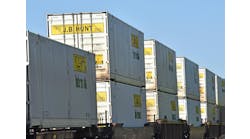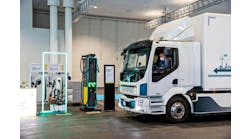| A palate for every palate |
People to tend to look at pallets as a necessary evil. They want to worry about either making product or distributing product or getting on their shelves. They don't want to really worry about whether or not there is a pallet sitting underneath it.
“If shippers could magically teleport product from point A to B, they would be happy,” says Mike Hachtman, vice president of business development, IFCO Systems North America (www.ifco-us.com). Nevertheless, the pallet remains one of the most economical and efficient ways to move product through the supply chain. “People just want to have pallets when and where they need them and not have to worry about them,” Hachtman notes.
For foodservice customers like Del Monte Fresh Produce Co. (www.delmonte.com) and Ventura Foods (www.venturafoods.com), which maintain multiple facilities across the country, the ability to have one pallet supplier that can meet their needs in a cost-effective way is of great importance.
Marketing its products under the Del Monte name, IFCO offers a range of fresh produce, including pineapples, potatoes and peaches. Ventura offers both branded and private label food products, including oils, dressings and shortenings.
Hachtman explains that IFCO has two different sets of customers. At the beginning of the supply chain are shippers — like those in food service — who have a broad customer base. They want to make sure they have pallets available that meets their packaging needs and are readily acceptable and useable by their customers.
“Ultimately the pallet is freed from load at the end of the supply chain,” notes Hachtman. “So the other group of our customers are retailers at the other end of the supply chain. Whether its K-Mart, Target, Albertson's or Winn-Dixie, they have too many pallets and want them to go away. We provide services to them by removing their pallets, which then becomes our raw material. We take that pallet, inspect and repair it, and then resell it.” The company has 55 pallet locations in North America, with 44 of them in the U.S.
Many large retailers don't want or need to have their employees handling pallets. They prefer to concentrate on distributing product efficiently to their stores and insuring they always have product. For a customer like Target, for example, IFCO has its own employees on sites at all 19 Target distribution centers in the U.S.
Since Target receives pallets from all sorts of suppliers, the products may arrive in a variety of materials and sizes. “We'll take those pallets from Target and if some of them meet their specs, we'll provide them back to them,” says Hachtman. “If others don't, we'll remove those pallets and give them credit for them, because someone else can use that pallet.”
These days, Hachtman notes, companies want to conduct more of their business online. Most of IFCO's technological activity — outside of electronic invoicing — is aimed at providing an audit trail for customers. IFCO's online pallet tracking system is called PalTrax.
“Companies can compare locations and identify best practices between locations,” says Hachtman. “If they have two locations that are both packaging carrots and sending out the same number of cases, but one is buying more pallets than another, that's something we should look into for cost savings.”
“At the end of the day,” Hachtman concludes, “for our customers a pallet is a widget.” What shippers are looking for, predominantly, is the ability to keep track of them. LT
Feedback on this article?
© Want to use this article?
Click here for options!
Copyright© 2004 Penton Media, Inc.


